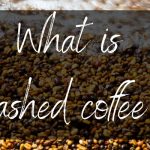You've heard of robusta, and probably not very pleasant things. Does robusta taste good ? Opinions are mixed on the matter, mostly because robusta is both useful, and also appealing to others.
Personally I like a coffee blend with robusta, since I feel it rounds up the taste.
But what about pure robusta, the 100% robusta and nothing else ? Let's see.

Table of Contents
So can robusta coffee taste good ?
Some robusta coffee can taste good. That's mostly gourmet coffee, grown on estates where everything is very carefully controlled so the coffee ends up just right.
But aside from that, regular robusta found on supermarket shelves is pretty bad.
Making coffee with just robusta beans is going to give you a very harsh cup. Some people enjoy it this way, but many don't.
The general public leans toward arabica's softer, fruitier tones.
But why is that ? Why isn't robusta a good coffee by default ? The answer is in the way the plant is made and what it puts forth.
What makes a good coffee ?
Good coffee is one that lets you enjoy the general flavor of the bean - figure out its origin, note any chocolate or wine flavors - without overwhelming you with bitterness.
Good coffee will bring body, mouthfeel, and a certain soft bitterness to the mix.
It will also bring a bit of acidity, though on the lower end. That's usually why people love arabica.
Robusta has a knack for being much too harsh. Growing a crop of delicious robusta is very difficult, since you're battling with the plant itself.
Robusta tends to be harsh, nutty, earthy, and definitely more bitter than arabica.
It's also higher in caffeine, actually almost double the amount of arabica. This makes the robusta bean even more bitter, and it almost always needs to be toned down with milk and sugar.
In short, good coffee is pleasant, flavorful, a bit bitter, and god enough to drink black.
Robusta misses almost all the points here.
Why robusta isn't that great on its own
There are a few short reasons robusta doesn't appeal to most people, and I'll explain them here.
First, robusta is known to be a very hardy plant, compared to arabica.
This means that the plant is less cared for than arabica, which means it will end up on soil that's not so great, so arabica can grow in the steep hills.
Robusta is often grown on elevations that aren't exactly high enough - more on high elevation coffee here.
Which means the soil won't be as good, and the terrain will not be at enough of an inclination.
This means that the water will not run off very quick, and the plant's cherries - coffee is a fruit, yes - end up getting less flavor.
Second, robusta is much higher in caffeine. It's 2.7% caffeine, and this adds to the harshness and bitterness of robusta beans.
This is a defense mechanism of the plant, to ward of pests.
And third, robusta produces much more cherries, which means the plant's limited nutrients need to be shipped to each cherry to make it ripe. But this lowers the overall quality of the crop.
Robusta coffee is great for coffee blends
Now, all that being said, robusta does get an overly bad rep.
Many coffee blends contain some amount of robusta.
This is necessary to balance out the flavor of arabica, with the strength of robusta.
For example there are blends which are 80/20 robusta/arabica, and these go wonderful with milk and sugar.
So, a cafe au lait, or any type of latte or cappuccino is going to work great with this kind of coffee blend.
Robusta is responsible for some very impressive crema in espresso coffee, but it's not recommended to use exclusively robusta.
If you were to only use robusta, like for Vietnamese coffee, then you would need to add some milk and sugar, to bring the drink to a drinkable state.
Otherwise it would be too strong.
And this is precisely because of the strong coffee taste that robusta brings, that it's used to balance arabica out.
Using only arabica would provide a rather watery, if flavorful, cup of coffee.
Maybe a comparison between robusta and arabica would help you understand better, and why robusta is very useful.
(If you like this article so far, you can pin it to your Pinterest board by clicking the image below. The article continues after the image.)
Robusta holds up very well to most other flavorings
If you were to make yourself some filter coffee, like I do in the morning, and to that add a significant amount of milk, and then some vanilla extract, how do you think your coffee would hold up ?
Would it still retain a good amount of its coffee taste ?
Mine does. It's a 50/50 arabica and robusta blend, and it's been my favorite since 2014.
What I've noticed about robusta coffee is that, on its own it's a terrible coffee. Sub par, and much too harsh unless you really know what you're doing.
But adding some robusta to arabica can make a world of difference. Much like adding a pinch of salt to baking something sweet.
It helps balance things out, and bring out the flavor.
So the more robusta your coffee blend has, the more fancy things you can do to it.
Turn into the world's most ridiculous latte, with lots of milk foam, and some strawberry syrup with chocolate shavings on top.
It will still taste like coffee enough that you will enjoy it.
I mentioned vanilla extract earlier. I do add that to my coffee, many mornings, and there are other combinations I found robusta blends hold up to very well:
- coconut milk and butter, along with regular milk
- rum extract
- vanilla extract
- almond extract
- almost as much milk as coffee (50/50)
All of these are, in my book, proof that we need robusta in our lives.
Robusta tastes much better is cold-brewed
Now, this might come as a sort of surprise, but really it shouldn't.
Cold brewing extracts nutrients and flavor quite differently from the ground coffee than how brewing.
This means there is much less acidity in the final brew, and the subtle nuances in coffee can be found a bit easier.
By no means will cold brewed robusta taste as good as arabica. But it will taste much better than hot brewed robusta, I'll tell you that much.
This also means it will give a stronger taste to the already strong cold brew. Which means your iced coffee will be even better, since you'll be able to flavor it even more.
If you're someone who's into stronger tasting coffee, then cold brewing robusta might be something you'll want to try.
In the end, it's all down to your preferences
No matter what you've read here, coffee is really down to preferences.
You might be appalled at how I flavor my coffee in the morning. Or, I might be your personal hero.
The point is that not everyone is going to like robusta in the morning coffee, and they'd be right to do so. Just as right as those who do like robusta in their coffee.
Little story: at work we got a new coffee machine, complete with new coffee. At the tasting test, it was decided that a pure arabica would be great.
A week after everyone at work tried the 100% arabica, it was unanimously decided that they need something stronger.
So we ended up with 30% robusta, 70% arabica.
Given the amount of lattes and cappuccinos that go around our workplace, it's no wonder you couldn't trace the taste of pure arabica.
Final thoughts
Robusta is always going to be up for debate, I think. It has its uses, and it's one of the strongest tasting coffees you will ever get your hands on.
It's just that it's much too harsh if you want a milder, more flavorful coffee. Adding milk (vegan or dairy) is kind of mandatory with robusta.
If you want to know more about coffee or tea, feel free to check the related articles below. Who knows what else you might find ?





